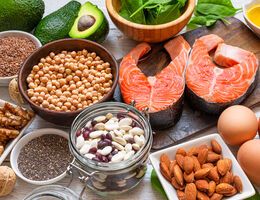Protein basics: Quantity and quality

May 19, 2025—Protein is one of the essential building blocks of good nutrition. It helps build muscle and maintain strength. It also helps your blood clot, fights infection and transports essential nutrients throughout your body, according to the Academy of Nutrition and Dietetics. And it helps you feel full after a meal.
It's a simple truth: You need adequate protein every day to help your body function at its best. What's not so simple is knowing how much you need and what types are healthiest for you. Let's break down the basics.
How much protein do you need?
In general, you should consume 0.8 grams of protein per kilogram each day, says the Arthritis Foundation. If you weigh 150 pounds, for example, that's 68 kilograms, which adds up to a little more than 54 grams of protein per day.
That may seem like a lot. But consider the amount of protein in these common foods:
- 1 cup of black beans: 15 grams.
- 1/2 cup of lentils: 8 grams.
- 2 tablespoons of peanut butter: 8 grams.
- 1 cup of quinoa: 8 grams.
- 4 ounces of tofu: 12 grams.
- 4 ounces of tempeh: 20 grams.
As you go throughout your day, you'll likely find that these individual servings of protein add up quickly.
You may need more or less protein each day than recommended above, depending on your age, health and other factors. Discuss your individual protein intake requirements with your doctor.
Make healthy protein choices
According to the American Heart Association (AHA), most Americans get more protein than they need, but their protein sources lack variety. Some protein choices are obvious: red meat, poultry, sausage, lunch meat and whole milk. However, these foods are often high in saturated fat or are highly processed. For these reasons, says the AHA, it's important to choose more low-fat, unprocessed and plant-based proteins.
Heart-smart protein choices include:
- Fatty fish, such as salmon, mackerel, sardines and bluefin tuna.
- Beans, peas and lentils.
- Walnuts, almonds and other nuts.
- Pumpkin seeds and chia seeds.
- Low-fat milk, yogurt and cottage cheese.
- Lean, unprocessed meat and poultry.
Protein bars and shakes can also contribute to your daily protein intake. But be sure to read the labels on these products before you buy them. Avoid the ones that contain high amounts of sugar and additives. Whey protein powder, which is made from milk, is high in protein and doesn't have as many additives.
More is not always better
Be careful not to consume too much protein. It could be detrimental to your health, especially if you have kidney stones, kidney disease, diabetes or lupus.
You can get all the protein you need on a plant-based diet. But make sure you're also getting other essential nutrients.
Sources
- AARP. "What You Need to Know About Protein Supplements." https://www.aarp.org/health/drugs-supplements/top-protein-powder/.
- Academy of Nutrition and Dietetics. "How Much Protein Should I Eat?" https://www.eatright.org/health/essential-nutrients/protein/how-much-protein-should-i-eat.
- American Heart Association. "Picking Healthy Proteins." https://www.heart.org/en/healthy-living/healthy-eating/eat-smart/nutrition-basics/picking-healthy-proteins.
- American Heart Association. "Protein: What's Enough?" https://www.heart.org/en/healthy-living/healthy-eating/eat-smart/nutrition-basics/protein-and-heart-health.
- Arthritis Foundation. "You Have Arthritis: How Much Protein Do You Really Need?" https://www.arthritis.org/health-wellness/healthy-living/nutrition/healthy-eating/protein-sources.
- Lupus Foundation of America. "Eat Healthy When You Have Lupus Nephritis." https://www.lupus.org/resources/eat-healthy-when-you-have-lupus-nephritis.
- National Kidney Foundation. "Diabetes and Kidney Disease." https://www.kidney.org/kidney-topics/diabetes-and-kidney-disease-stages-1-4.
- National Kidney Foundation. "Kidney Stone Diet Plan and Prevention." https://www.kidney.org/kidney-topics/kidney-stone-diet-plan-and-prevention.
